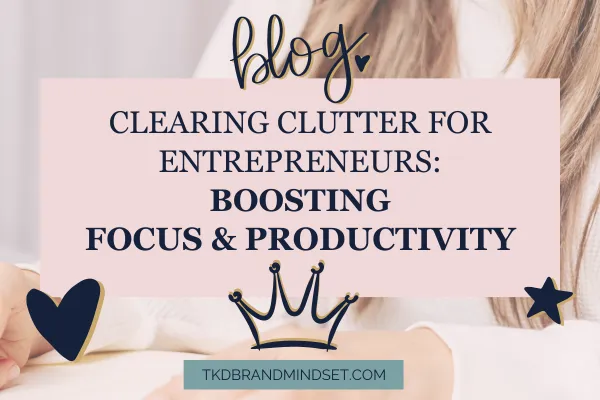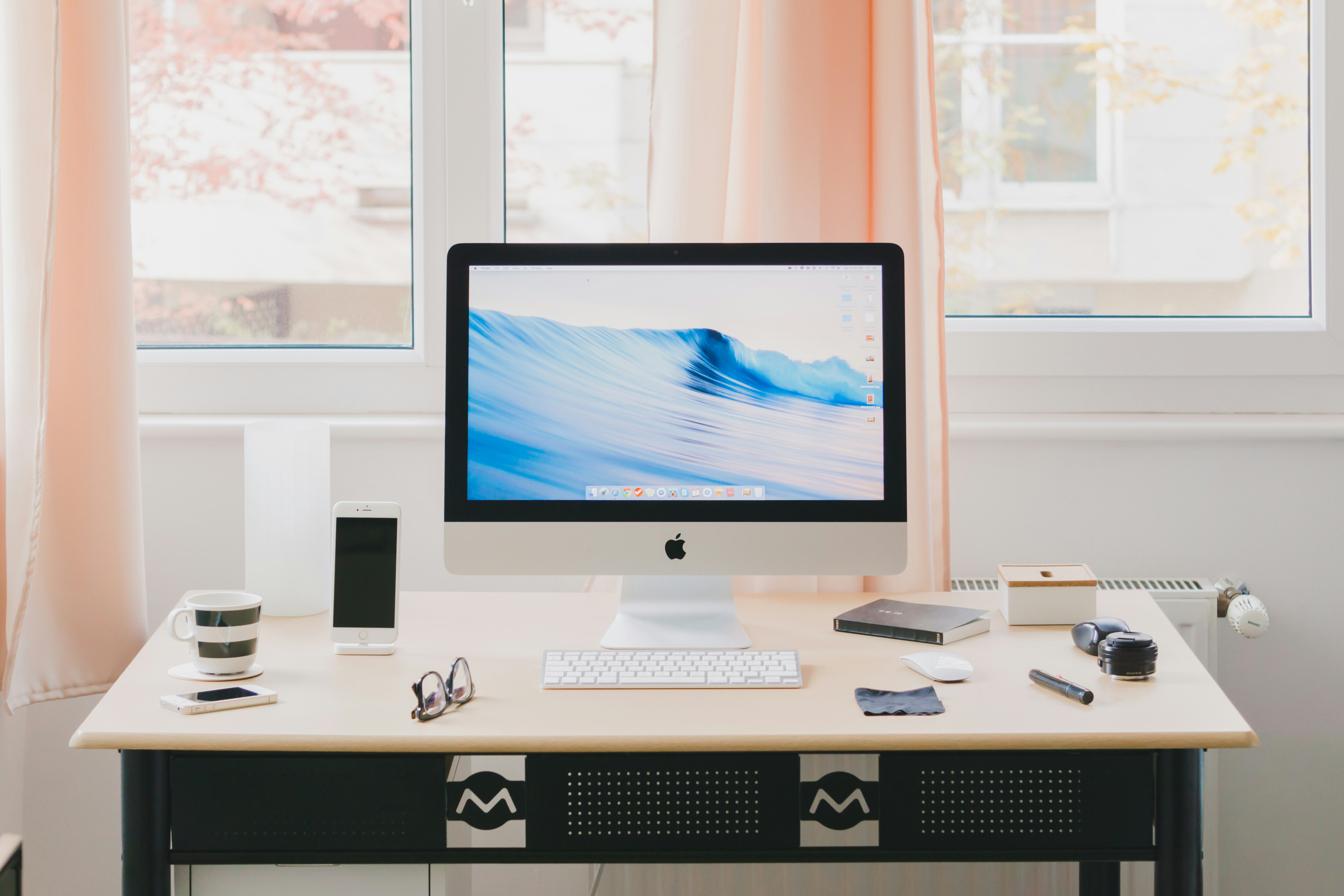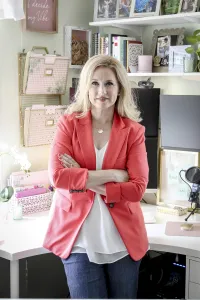My BLOG
Get To Work, Girl

Clearing Clutter for Entrepreneurs: Boosting Focus & Productivity
“A cluttered space often enhances the feelings of overwhelm. So when we get that out of the way, we can focus on what's important and our stress levels and anxiety levels come down.”
Let's Get To Work 💪
Being a successful entrepreneur demands laser-sharp focus. But what happens when your environment or your mind is riddled with distractions?
Clutter, both physical and mental, can be a significant roadblock to achieving your entrepreneurial goals.
Today, we'll explore how decluttering can increase productivity and improve your business.

The Vicious Cycle of Clutter 😱
Both physical and mental clutters feed into each other, creating a never-ending cycle.
While a messy desk might lead to wasted time searching for tools, mental clutter can delay decision-making.
This cyclical effect leaves many entrepreneurs feeling overwhelmed and unproductive.
The Physical Toll of Clutter
1. Wasted Time:
How often do you spend precious minutes, or even hours, searching for a document, a tool, or an essential digital file?
Every second you waste looking for these resources is time taken away from scaling and building your business.
2. Reduced Creativity:
With an abundance of clutter, your mental space gets preoccupied. You find yourself merely skimming through tasks rather than diving deep into them.
3. Perceived Unprofessionalism:
In our digital age, where virtual meetings are commonplace, a cluttered background can give an impression of disorganization, making you seem less credible to clients and partners.
4. Mental Exhaustion:
An untidy space can be mentally draining. It becomes a nagging reminder of other tasks you should be tackling.
The Mental Cost of Clutter
1. Lack of Concentration:
Mental clutter translates into an overload of thoughts. It becomes challenging to fixate on one task, leading to constant distractions and reduced efficiency..
2. Decision Fatigue:
When your mind is brimming with half-formed ideas and tasks, it becomes impossible to make clear decisions, leading to poor choices.
3. Missed Opportunities:
A preoccupied mind might make you miss out on valuable opportunities or even forget essential tasks.
4. Self-Imposed Limitations:
Often, our mental clutter stems from self-doubt. Thoughts like "I'm not ready," or "It needs to be perfect," prevent us from taking decisive actions.
Reclaiming Your Space and Mind 🕊️
Physical and mental declutters are crucial to refocus and reenergize your entrepreneurial journey. Here's how you can start:
1. Physical Decluttering:
Start Small: Begin with your workspace. It's not about cleaning the entire room but making sure your work area is organized.
Keep Essentials Accessible: Ensure that the tools you need regularly, be it your planner or your devices, are within easy reach.
Discard Distractions: Any item that doesn't add value to your workspace should be removed..
2. Mental Decluttering:
Prioritize Tasks: Instead of jumping from one task to another, list them out, and prioritize.
Limit New Ideas: It's okay to keep a list of new ideas, but don't let them distract you from your current projects.
Seek Clarity: If you're feeling overwhelmed, take a break. Meditate, take a walk, or do something that helps clear your mind.
As women entrepreneurs, it's essential to recognize the impediments clutter can pose to our businesses. By actively decluttering both our physical workspace and our minds, we not only pave the way for improved productivity but also set ourselves up for sustained success.
Watch the full podcast version of this blog here:
The Physical Declutter Process 📦
In today's world of multitasking, where we often find our workspaces inundated with items, both necessary and extraneous, achieving an organized and clutter-free environment is essential. Here's a detailed guide to decluttering and re-organizing your workspace.
1. Assessment:
Take a moment to truly assess your workstation. This doesn't mean diving into sorting everything immediately. Instead, sit down and mentally evaluate everything present.
Identify what's essential for your work.
Pinpoint rarely used items.
Recognize items that bring you joy.
Spot the unnecessary clutter.
Allocate a brief 5-10 minutes for this. You'll soon see items that can be easily discarded. For now, place them aside.
2. Categorization:
The next step focuses on categorizing like items:
Writing tools: notebooks, pens, markers.
Craft tools: if you're into pottery or jewelry making.
Tech tools: cords, chargers, adapters.
Even if it's a short 5-minute interval, categorizing can be incredibly beneficial. By organizing items into groups, it becomes easier to decide which to retain and which to discard.
3. Elimination Process:
The elimination stage can be challenging, but it's crucial. This step involves:
Discarding outdated items.
Getting rid of dysfunctional or incomplete items.
Evaluating whether an item still serves its original purpose.
Let go of things, even if they cost money. Your workspace is more valuable when functional, not cluttered. Whether you recycle, donate, or trash items, the goal is to clear your space.
4. Designated Spaces:
Now that you've decluttered, it's crucial to maintain the tidiness. Assign specific spots for each item:
Frequently used items should be within arm's reach.
Rarely used items, like a camera case if you don't travel, can be placed further away.
Having a designated space for every item ensures you can locate them quickly and prevents future clutter.
5. Use of Organizational Tools:
Before you rush to buy new organizational tools, consider what you already have:
Use trays, binders, and drawers for storage.
Label items if necessary.
Arrange items in a way that feels intuitive and comfortable.
6. Maintain a Routine:
The final and perhaps most crucial step is establishing a routine to prevent clutter from creeping back in:
Weekly: A quick review of your desk, placing items back in their designated spots.
Monthly: Discard or replace items that are used up or running low.
Quarterly: Reassess your organizational tools and make any necessary changes.
By following this routine, you're not just organizing your workspace once but ensuring it remains a place of productivity and clarity.

The Benefits of Physical Decluttering:
Decluttering isn't just about tidiness; it's about enhancing productivity, reducing stress, and creating a workspace that inspires and invigorates. With these steps, you're well on your way to achieving just that.
With this now clutter-free space, we have the ability to foster creativity because an organized space removes visual distractions.
We boost efficiency because we know where things are and we can get them and do the job with them and put them back.
We've now reduced stress, which in turn enhances our focus, and we are able to get out there and kill the procrastination around what we're gonna do to organize this space and we can get the job done.
Plus on camera we look professional because we're in an organized and clutter-free space.
The Mental Declutter Process 🧠
After addressing the physical mess in our workspace, it's time to move to perhaps the more challenging domain – our minds.
Here are seven steps to help declutter your mental space, and why it’s essential.
1. Set Clear Goals:
Our minds are often scattered, juggling myriad thoughts and ideas simultaneously. To prevent overwhelm, establish clear long-term objectives and then break these down into manageable short-term targets. By having a distinct vision, you can hone your focus, ensuring that distractions don’t send you down unproductive paths.
2. Practice Mindfulness:
Negative self-talk can severely hinder productivity. To counter this, engage in mindfulness exercises like meditation, affirmations, or guided visualization. This practice will keep your mental energies grounded and positive.
3. Use a Day Planner:
Go old-school with a physical day planner. While digital versions are convenient, they can also be distracting.
A physical planner not only helps you schedule tasks but also acts as a space for jotting down thoughts and ideas.
This way, you can circle back to them later without losing focus on your current task.
4. Create To-Do Lists:
Having a clear list of tasks can sharpen your focus. Write them down, prioritize, and if needed, reprioritize. To keep everything streamlined, make sure this to-do list is part of your daily planner.
5. Time Blocking:
Allocate specific blocks of time to tasks. Techniques like the Pomodoro method, where you work for a designated period and then take a break, can be incredibly effective.
If you’re seeking tools to help streamline this process, check out my daily anti-distraction planner linked in the notes.
6. Limit Information Intake:
In our digital age, the constant influx of information can be paralyzing. While it's tempting to hop on every webinar or download every freebie, often, these only serve as distractions.
Once you’ve set a goal, focus solely on it. If you need to learn something new to achieve that goal, allocate time specifically for that, and then get back on track.
7. Regular Reflection:
Take time to reflect on your accomplishments and pat yourself on the back. Celebrate your victories, no matter how small.
This regular mental inventory can highlight areas where negative thoughts might be creeping back in – recognize them, address the root cause, and discard them.

The Benefits of Mental Decluttering:
Just like tidying up your physical space, cleaning up your mental realm has numerous advantages:
Enhanced Focus: Without competing thoughts, focusing becomes more straightforward.
Improved Productivity: A clearer mind can focus better and thereby produce more.
Organized Approach: An orderly mind reduces stress, making tasks more manageable.
Better Decision Making: Clear away the mental clutter, and decision-making becomes significantly easier.
While decluttering our physical spaces is crucial, addressing the clutter in our minds is equally, if not more, important. Taking regular steps to ensure our mental clarity will result in a more focused, productive, and stress-free life.
The Benefits of Maintaining a Decluttered Mind & Environment:
Finally, I want to address the lasting influence of maintaining a decluttered mind and environment. An enhanced productivity tops this list.
Picture this: every time you have to search for a missing file or an essential tool, you're wasting precious minutes – sometimes even hours. By being organized, you can immediately access what you need.
This also translates to quicker, more informed decision-making because of the clarity in your surroundings and mind.
The reduction of stress and anxiety cannot be understated.
The ripple effect of consistently operating in a clutter-free environment means stress doesn’t get a foothold. Your brain doesn’t need to combat for attention due to myriad distractions, granting you the luxury of clarity.
This naturally shields you from the paralyzing feelings of being overwhelmed, fortifying your overall mental well-being for the foreseeable future.
Here's something every entrepreneur will resonate with: our focus is paramount.
The lesser the distractions from our physical and mental space, the longer and more intently we can focus. This proves invaluable, especially in areas requiring concentration, strategic planning, and financial management.
This act of decluttering doesn't only bring about consistency in the quality of work but also bolsters confidence, brings about a work-life balance, and even leads to financial savings.
How?
You're not impulsively purchasing yet another course or repetitively buying items you've misplaced.
Furthermore, an uncluttered mind is fertile ground for innovation.
New ideas find a hospitable space, germinating into solutions without competing against the clamor of distractions. As a result, your brand image becomes laser-sharp, completely aligned with your vision and purpose.
Personal growth isn’t left behind either. This newfound space facilitates growth, both in business and personal realms.
The dimensions you explore, the horizons you broaden – it’s an exhilarating journey of self-discovery.
To boil down the essence of decluttering: it's about effective time management, reduced stress, clear boundaries, elevated energy levels, and enhanced productivity.
All these are intertwined, feeding into one another.
However, all this might sound overwhelming. Amidst our already packed schedules and limited energy reservoirs, how do we start?
Focus on these pivotal elements:
Prioritize Self-Care: This isn’t a luxury but an absolute necessity. The time saved from decluttering can be channeled into self-care rituals.
Delegate When Necessary: Understand that you can't wear every hat. This doesn't always mean hiring someone; sometimes, it’s about leveraging technology.
Embrace ‘No’: Declining isn’t negative. Say no to unnecessary events, ideas, or even enticing freebies to preserve your clutter-free space.
Regular Check-Ins: Allocate moments for introspection. Understand what you're doing and if it aligns with your objectives.
The ultimate objective here was to spotlight the paramount importance of decluttering, both mentally and physically, and the practical pathways to achieving it.
As women navigating the challenging terrains of business, we'll encounter these struggles repeatedly.
Hence, the need for periodic revisits to these principles is vital.
Your distractions don’t define you.
So, be you, believe in you, focus on you...and let's get to work.
Who is the author?
My name is Tina K. Davis and own multiple businesses while struggling with ADHD. Being one myself, I help easily distracted women entrepreneurs that are struggling to find their brand voice and target audiences generate revenue.
ADHD and my surroundings have always been what defined my future because I let it.
Every time I had an idea, the excitement and distractions quickly built up and the focus ran out on me. I began to question why I thought I could even run a business.
Sadly, many entrepreneurs won't see their full potential because of this same “distraction monster”.
Today there is an overwhelming amount of information overload. Most of the information is not consumable for someone who is easily distracted. The work seems impossible to wade through and complete on time. I also realized that only about 20% of what I was being exposed to was even beneficial for me. More importantly, it was the only amount consumable for me.
What did I do? I put together an easily consumable program that resolved the overwhelm, guided my focus and mindset, clarifying my branding.
Instead of pushy “hustle culture” coaching, detailed courses and trainings, I created bite sized, self-paced “nuggets” of opportunity for the busy minded.
My mission is to help as many women that want to start or scale a business who are consumed by distractions make their entrepreneurial dreams come true.


FREE DOWNLOAD
Plan and prioritize your day without the overwhelm!
Download this FREE daily planner and get started TODAY on tackling the distractions and creating that dream life!
© Copyright 2021 TKD Brand Mindset - Brand Mindset Academy
